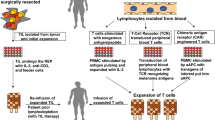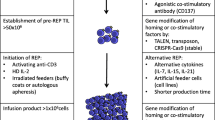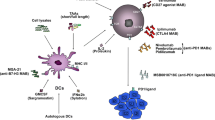Abstract
Immunotherapy is an effective treatment option for a small percentage of patients with advanced melanoma or at high risk for recurrence after resection of the primary tumor. However, a long period of unsuccessful immune modulation trials involving new cytokines, antibodies, cancer vaccines, adoptive immunotherapy, and combinations generated doubts that benefit could be extended to a larger group of patients. Renewed optimism for the therapeutic potential of immune therapy is currently driven by key advances in tumor immunobiology, including the potential to manipulate and disrupt immune activation checkpoints and tumor defense mechanisms; newer approaches to antigen presentation for immune activation; refinements to procedures for antigen-specific T-cell expansions in vitro and preparative regimens to support their expansion and activity in vivo; gene transfer to alter lymphocyte specificity and function; and the potential for discovery of improved predictive biomarkers to select patients for individual treatments. Proof of concept is provided by durable remissions observed in patients with advanced melanoma enrolled in clinical trials of anti-CTLA-4 and in new studies of adoptively transferred tumor antigen-specific lymphocytes combined with lymphocyte ablation conditioning regimens. Many agents now being developed are predicted to produce broader, more potent, and more effective antitumor immune responses.
Similar content being viewed by others
References and Recommended Reading
Tsao H, Atkins MB, Sober AJ: Management of cutaneous melanoma. N Engl J Med 2004, 351:998–1012.
Korn EL, Liu PY, Lee SJ, et al.: Meta-analysis of phase II cooperative group trials in metastatic stage IV melanoma to determine progression-free and overall survival benchmarks for future phase II trials. J Clin Oncol 2008, 26:527–534.
Atkins MB, Lotze MT, Dutcher JP, et al.: High-dose recombinant interleukin 2 therapy for patients with metastatic melanoma: analysis of 270 patients treated between 1985 and 1993. J Clin Oncol 1999, 17:2105–2116.
Kirkwood JM, Manola J, Ibrahim J, et al.: A pooled analysis of eastern cooperative oncology group and intergroup trials of adjuvant high-dose interferon for melanoma. Clin Cancer Res 2004, 10:1670–1677.
Atkins MB: Cytokine-based therapy and biochemotherapy for advanced melanoma. Clin Cancer Res 2006, 12:2353s–2358s.
Smith FO, Downey SG, Klapper JA, et al.: Treatment of metastatic melanoma using interleukin-2 alone or in conjunction with vaccines. Clin Cancer Res 2008, 14:5610–5618.
Yu H, Kortylewski M, Pardoll D: Crosstalk between cancer and immune cells: role of STAT3 in the tumour microenvironment. Nat Rev Immunol 2007, 7:41–51.
Drake CG, Jaffee E, Pardoll DM: Mechanisms of immune evasion by tumors. Adv Immunol 2006, 90:51–81.
Gajewski TF, Meng Y, Blank C, et al.: Immune resistance orchestrated by the tumor microenvironment. Immunol Rev 2006, 213:131–145.
Demotte N, Stroobant V, Courtoy PJ, et al.: Restoring the association of the T cell receptor with CD8 reverses anergy in human tumor-infiltrating lymphocytes. Immunity 2008, 28:414–424.
Katz JB, Muller AJ, Prendergast GC: Indoleamine 2,3-dioxygenase in T-cell tolerance and tumoral immune escape. Immunol Rev 2008, 222:206–221.
Buckanovich RJ, Facciabene A, Kim S, et al.: Endothelin B receptor mediates the endothelial barrier to T cell homing to tumors and disables immune therapy. Nat Med 2008, 14:28–36.
Marigo I, Dolcetti L, Serafini P, et al.: Tumor-induced tolerance and immune suppression by myeloid derived suppressor cells. Immunol Rev 2008, 222:162–179.
Groh V, Wu J, Yee C, Spies T: Tumour-derived soluble MIC ligands impair expression of NKG2D and T-cell activation. Nature 2002, 419:734–738.
Solana R, Casado JG, Delgado E, et al.: Lymphocyte activation in response to melanoma: interaction of NK-associated receptors and their ligands. Cancer Immunol Immunother 2007, 56:101–109.
Lin KY, Lu D, Hung CF, et al.: Ectopic expression of vascular cell adhesion molecule-1 as a new mechanism for tumor immune evasion. Cancer Res 2007, 67:1832–1841.
Steinman RM: Dendritic cells in vivo: a key target for a new vaccine science. Immunity 2008, 29:319–324.
Melero I, Hervas-Stubbs S, Glennie M, et al.: Immunostimulatory monoclonal antibodies for cancer therapy. Nat Rev Cancer 2007, 7:95–106.
Dudley ME, Yang JC, Sherry R, et al.: Adoptive cell therapy for patients with metastatic melanoma: evaluation of intensive myeloablative chemoradiation preparative regimens. J Clin Oncol 2008, 26:5233–5239.
Rosenberg SA, Yannelli JR, Yang JC, et al.: Treatment of patients with metastatic melanoma with autologous tumorinfiltrating lymphocytes and interleukin 2. J Natl Cancer Inst 1994, 86:1159–1166.
Weber J: Ipilimumab: controversies in its development, utility, and autoimmune adverse events. Cancer Immunol Immunother 2009, 58:823–830.
Ribas A: Overcoming immunologic tolerance to melanoma: targeting CTLA-4 with tremelimumab (CP-675,206). Oncologist 2008, 13(Suppl 4):10–15.
Downey SG, Klapper JA, Smith FO, et al.: Prognostic factors related to clinical response in patients with metastatic melanoma treated by CTL-associated antigen-4 blockade. Clin Cancer Res 2007, 13:6681–6688.
Dudley ME, Wunderlich JR, Shelton TE, et al.: Generation of tumor-infiltrating lymphocyte cultures for use in adoptive transfer therapy for melanoma patients. J Immunother 2003, 26:332–342.
Lee PP, Yee C, Savage PA, et al.: Characterization of circulating T cells specific for tumor-associated antigens in melanoma patients. Nat Med 1999, 5:677–685.
Preuss KD, Zwick C, Bormann C, et al.: Analysis of the B-cell repertoire against antigens expressed by human neoplasms. Immunol Rev 2002, 188:43–50.
Fife BT, Bluestone JA: Control of peripheral T-cell tolerance and autoimmunity via the CTLA-4 and PD-1 pathways. Immunol Rev 2008, 224:166–182.
Dong H, Strome SE, Salomao DR, et al.: Tumor-associated B7-H1 promotes T-cell apoptosis: a potential mechanism of immune evasion. Nat Med 2002, 8:793–800.
Sadlack B, Lohler J, Schorle H, et al.: Generalized autoimmune disease in interleukin-2-deficient mice is triggered by an uncontrolled activation and proliferation of CD4+ T cells. Eur J Immunol 1995, 25:3053–3059.
Sakaguchi S, Yamaguchi T, Nomura T, Ono M: Regulatory T cells and immune tolerance. Cell 2008, 133:775–787.
Antony PA, Paulos CM, Ahmadzadeh M, et al.: Interleukin-2-dependent mechanisms of tolerance and immunity in vivo. J Immunol 2006, 176:5255–5266.
Teague RM, Sather BD, Sacks JA, et al.: Interleukin-15 rescues tolerant CD8+ T cells for use in adoptive immunotherapy of established tumors. Nat Med 2006, 12:335–341.
Zeng R, Spolski R, Finkelstein SE, et al.: Synergy of IL-21 and IL-15 in regulating CD8+ T cell expansion and function. J Exp Med 2005, 201:139–148.
Wan YY, Flavell RA: TGF-beta and regulatory T cell in immunity and autoimmunity. J Clin Immunol 2008, 28:647–659.
Rosenberg SA, Restifo NP, Yang JC, et al.: Adoptive cell transfer: a clinical path to effective cancer immunotherapy. Nat Rev Cancer 2008, 8:299–308.
Muranski P, Boni A, Antony PA, et al.: Tumor-specific Th17-polarized cells eradicate large established melanoma. Blood 2008, 112:362–373.
Morgan RA, Dudley ME, Wunderlich JR, et al.: Cancer regression in patients after transfer of genetically engineered lymphocytes. Science 2006, 314:126–129.
Stephan MT, Ponomarev V, Brentjens RJ, et al.: T cell-encoded CD80 and 4-1BBL induce auto- and transcostimulation, resulting in potent tumor rejection. Nat Med 2007, 13:1440–1449.
Rosenberg SA, Yang JC, Restifo RP: Cancer immunotherapy: moving beyond current vaccines. Nat Med 2004, 10:909–915.
Bonifaz LC, Bonnyay DP, Charalambous A, et al.: In vivo targeting of antigens to maturing dendritic cells via the DEC-205 receptor improves T cell vaccination. J Exp Med 2004, 199:815–824.
Dubsky P, Saito H, Leogier M, et al.: IL-15-induced human DC efficiently prime melanoma-specific naive CD8+ T cells to differentiate into CTL. Eur J Immunol 2007, 37:1678–1690.
Ahonen CL, Wasiuk A, Fuse S, et al.: Enhanced efficacy and reduced toxicity of multifactorial adjuvants compared with unitary adjuvants as cancer vaccines. Blood 2008, 111:3116–3125.
van Elsas A, Sutmuller RP, Hurwitz AA, et al.: Elucidating the autoimmune and antitumor effector mechanisms of a treatment based on cytotoxic T lymphocyte antigen-4 blockade in combination with a B16 melanoma vaccine: comparison of prophylaxis and therapy. J Exp Med 2001, 194:481–489.
Wing K, Onishi Y, Prieto-Martin P, et al.: CTLA-4 control over Foxp3+ regulatory T cell function. Science 2008, 322:271–275.
Hegel JK, Knieke K, Kolar P, et al.: CD152 (CTLA-4) regulates effector functions of CD8+ T lymphocytes by repressing Eomesodermin. Eur J Immunol 2009, 39:883–893.
Ribas A, Hauschild A, Kefford R, et al.: Phase III, openlabel, randomized, comparative study of tremelimumab (CP-675,206) and chemotherapy (temozolomide or dacarbazine) in patients with advanced melanoma [abstract]. J Clin Oncol 2008, 26:LBA9011.
Maker AV, Phan GQ, Attia P, et al.: Tumor regression and autoimmunity in patients treated with cytotoxic T lymphocyte-associated antigen 4 blockade and interleukin 2: a phase I/II study. Ann Surg Oncol 2005, 12:1005–1016.
Hunder NN, Wallen H, Cao J, et al.: Treatment of metastatic melanoma with autologous CD4+ T cells against NY-ESO-1. N Engl J Med 2008, 358:2698–2703.
Brahmer JR, Topalian S, Wollner I, et al.: Safety and activity of MDX-1106 (ONO-4538), an anti-PD1 monoclonal antibody, in patients with selected refractory or relapsed malignancies [abstract]. J Clin Oncol 2008, 26:3006.
Vonderheide RH, Flaherty KT, Khalil M, et al.: Clinical activity and immune modulation in cancer patients treated with CP-870,893, a novel CD40 agonist monoclonal antibody. J Clin Oncol 2007, 25:876–883.
Author information
Authors and Affiliations
Corresponding author
Rights and permissions
About this article
Cite this article
Sznol, M. Betting on immunotherapy for melanoma. Curr Oncol Rep 11, 397–404 (2009). https://doi.org/10.1007/s11912-009-0053-z
Published:
Issue Date:
DOI: https://doi.org/10.1007/s11912-009-0053-z




